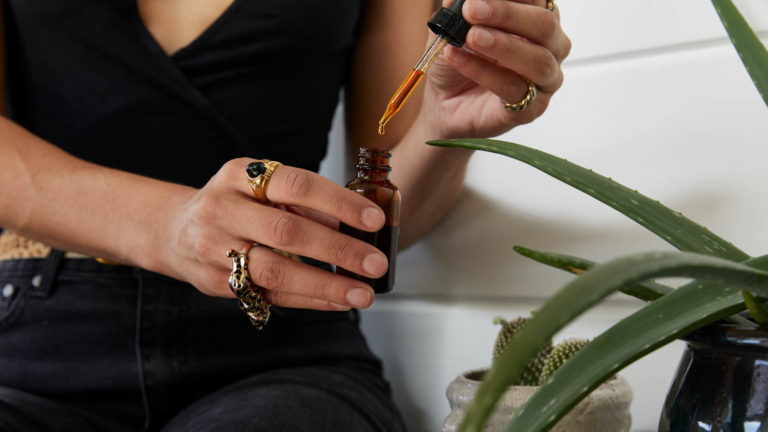Adult-use and medical marijuana are legal in Massachusetts.
The 2018 Farm Bill made hemp cultivation federally legal, paving the way for the legalization of hemp-derived CBD products nationwide, although a gray area remains for cannabidiol (CBD) legality. The Massachusetts Department of Agricultural Resources and the Massachusetts Department of Health prohibit the sale of food or products containing hemp-derived CBD that makes therapeutic or medicinal claims. However, in June 2019, Bill H4001 was introduced in the Massachusetts House of Representatives but stalled in committee, in an effort to clear up confusion surrounding CBD legality in Massachusetts. The act reclassified ingestible CBD as a food product and allowed CBD oil in cosmetic and personal care products.
What is CBD?
Cannabidiol is one of the primary cannabinoids found in the cannabis plant, second only to THC. Unlike THC, CBD is non-intoxicating and offers potential therapeutic benefits, including anti-inflammatory, anti-anxiety, analgesic, and seizure-suppressing properties.
Why is CBD sometimes illegal?
Though hemp strains don't produce enough THC to cause intoxication, all varieties of cannabis, including help, were considered federally illegal under the 1970 Federal Controlled Substances Act. Under that legislation, all cannabis fell under Schedule 1, which defines cannabis as a controlled substance with no accepted medical use, a high potential for abuse, and a likelihood for addiction.
 Photo by: Gina Coleman/Weedmaps
Photo by: Gina Coleman/WeedmapsImage lightbox

That changed with the passing of the 2018 Farm Bill, which legalized hemp cultivation and created a path to remove hemp from Schedule 1 by creating a legal distinction between hemp and marijuana. Under the legislation, hemp is classified as cannabis that contains less than 0.3% THC by weight, while marijuana is cannabis that contains more than 0.3% THC. The bill effectively removed hemp-derived CBD's status as a Schedule 1 substance. However, because marijuana retained its schedule classification, marijuana-derived CBD is still considered federally illegal. The 2018 Farm Bill made hemp an agricultural commodity and required it to be produced and sold under regulations that implement the bill, which have yet to be enacted by the United States Department of Agriculture (USDA).
The 2018 Farm Bill also retained the power of the Food and Drug Administration (FDA)to regulate CBD's therapeutic claims, labeling, and its use as a food additive. The FDA maintains its stance that even hemp-derived CBD may not be used as an additive to food and beverages or marketed as a dietary supplement. The FDA also has yet to revise its rules or specifically regulate CBD products, which has led to confusion about CBD legality. The FDA has been particularly strict on CBD regulations when it comes to health claims that could be construed as medical advice.
Massachusetts CBD laws
Even though the 2018 Farm Bill legalized hemp-derived CBD, it also left room for states to independently regulate its production and sale. Massachusetts has strict rules surrounding hemp-derived CBD legality. Under current laws, CBD oil cannot be added to any food or beverage products. It also can't be marketed as having any medical or therapeutic benefits unless the product has been evaluated and approved by the FDA.
To date, Massachusetts has not submitted a plan to regulate hemp within the state. The website for the Massachusetts Department of Agriculture (MDAR) clarifies that it is waiting for the USDA to issue guidance before it develops a state plan for regulating hemp.
Licensing requirements for CBD
Currently, anyone proposing to plant, grow, harvest, process, or sell industrial hemp in Massachusetts must apply for a license through the MDAR. Massachusetts tests all crops prior to harvest to ensure THC levels are less than 0.3%.
 Photo by: Gina Coleman/Weedmaps
Photo by: Gina Coleman/WeedmapsImage lightbox

Under current laws, hemp-derived CBD is still banned and the sale of hemp-derived CBD products, including CBD oil, is prohibited. Massachusetts and federal regulators are still evaluating CBD from hemp to determine its safety for use as a food additive or supplement. However, it isn't entirely clear if and how the state plans to enact these regulations or penalize retailers who continue to sell CBD products.
Massachusetts CBD possession limits
Because hemp-derived CBD and CBD oil are currently prohibited under Massachusetts law, there are no clear possession limits. However, under current Massachusetts cannabis laws, adults 21 years or older can possess up to 1 ounce of cannabis on their person and up to 10 ounces in their home, including CBD.
Where to buy CBD in Massachusetts
The sale of hemp-derived CBD products at retailers is currently prohibited in Massachusetts, although many retailers continue to make them available for purchase. Marijuana-derived CBD is for sale at state dispensaries. Purchasing from a retailer allows consumers to interact with the retailer and get any questions about the product answered prior to making a purchase.
But purchasing CBD products from a retailer isn't the only option. Because hemp-derived CBD is now federally legal, consumers can also purchase CBD products online.
How to read CBD labels and packaging
Whether you're purchasing CBD from an online retailer or a retail location in Massachusetts, you want to make sure you're purchasing a reputable product, and that it follows current guidelines for labels and packaging.
Under current FDA regulations, CBD oil and other hemp-derived CBD products cannot make any therapeutic or medical claims on their labels.
The FDA does not currently allow CBD products to be labeled as dietary supplements, so the labels lack the kind of information required of regulated supplements. However, most reputable CBD producers will typically include the following information on their CBD product labels:
- Amount of active CBD per serving
- Supplement Fact panel, including other ingredients
- Net weight
- Manufacturer or distributor name
- Suggested use
- Full-spectrum, broad-spectrum, or isolate
- Batch or date code

